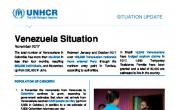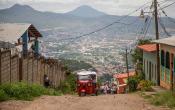United States of America Regional Office
The UNHCR’s Regional Office in Washington covers operations in the United States, 15 Caribbean states and 9 overseas territories including Antigua and Barbuda, the Bahamas, Barbados, Belize (until 2017), Dominica, Dominican Republic, Grenada, Guyana, Haiti, Jamaica, St. Kitts and Nevis, St. Lucia, St. Vincent and the Grenadines, Suriname and Trinidad and Tobago; the British overseas territories of Anguilla, Bermuda, British Virgin Islands, Cayman Islands, Montserrat and Turks and Caicos Islands; and the Dutch overseas territories of the Kingdom of the Netherlands: Aruba, Curacao and Sint Maarten.
Operation: United States of America Regional Office
Location
{"longitude":-77,"latitude":20,"zoom_level":4,"iso_codes":"'ABW','AIA','ATG','BES','BHS','BLZ','BMU','BRB','CUW','CYM','DMA','DOM','GRD','GUY','HTI','JAM','KNA','LCA','MSR','PRI','SUR','SXM','TCA','TTO','USA','VCT','VGB'"}
By clicking on the icons on the map, additional information is displayed.
Key Figures
| 2017 year-end figures | |
| 3,200 | kilometer border mission, including situational assessment of 8 out of 9 Customs and Border Protection Sectors, on the southern border were carried out |
| 2,780 | people, originating from 143 countries, were provided with food, shelter, education and health assistance |
| 802 | group A individuals and 445 registered descendants received support to request validation of their Dominican documents in the Dominican Republic |
| 100% | compliance rate with 118 offices reporting monthly on resettlement activities on the online reporting portal that UNHCR helped to develop |
| 2018 planning figures | |
| 70% | of applicants will have access to status determination procedures |
| 60% | of reception conditions will meet minimum standards |
| 55% | of stateless persons will be naturalized |
People of Concern
18%
Increase in
2016
2016
| 2016 | 824,071 |
| 2015 | 696,796 |
| 2014 | 667,000 |

[["Refugees",273793],["Asylum-seekers",546258],["Stateless",2302],["Others of concern",1718]]
Loading ...
United States of America Regional Office
< Back
2017
{"categories":[2013,2014,2015,2016,2017,2018],"budget":[18.89196675,18.37469792,20.2999998,22.29719746,28.049069996,33.87014168],"expenditure":[10.30046598,9.58497656,7.86237461,11.10863967,13.88449908,null]}
{"categories":[2013,2014,2015,2016,2017,2018],"p1":[6.10626973,7.70721431,11.32899624,13.63039142,16.05474992,25.67811932],"p2":[8.85035402,7.39718888,8.97100356,8.66680604,11.994320076,8.19202236],"p3":[null,null,null,null,null,null],"p4":[3.935343,3.27029473,null,null,null,null]}
{"categories":[2013,2014,2015,2016,2017,2018],"p1":[5.03311855,5.43034147,4.95750044,7.61021868,7.79743402,null],"p2":[4.17918809,3.53406058,2.90487417,3.49842099,6.08706506,null],"p3":[null,null,null,null,null,null],"p4":[1.08815934,0.62057451,null,null,null,null]}
Loading ...
CHOOSE A YEAR
- 2016
- 2017
- 2018
Operational context
As a result of the change of government in the United States of America in 2017, the refugee policy experienced new uncertainty, resulting in challenges for UNHCR and people of concern. The increased politicization of refugee protection urgently threatened to narrow the asylum space and shift public opinion. Meanwhile, mixed movements from the North of Central America increased, and the unfolding Venezuela situation in the Caribbean resulted in increased numbers of asylum-seekers requiring direct protection and assistance interventions.Population trends
In 2017, there was a continued increase in asylum claims lodged in the US, with the backlog topping 700,000. Stateless people remained unidentified and unaccounted. UNHCR resettlement arrivals to the US decreased to 24,559 - despite this, the United States remain the world’s largest resettlement country.In the Caribbean, several countries directly off the coast of Venezuela – particularly Trinidad and Tobago, Aruba and Curaçao – were hosting significant numbers of Venezuelans by end 2017, particularly considering their population sizes: in Trinidad and Tobago, the Venezuelan population was estimated at 40,000 (representing 3 per cent of the total population); in Aruba, at 20,000 (16 per cent); and in Curacao, at 5,000 (3 per cent).
Key achievements
- Due in part to concerted advocacy and engagement from the Regional Office, the US remained UNHCR’s largest donor in 2017.
- For protection and solutions in the US, major achievements included the holding of a high-level protection dialogue with the new US Administration, the provision of technical advice as member of advisory committee for DHS case management ATD for families, until the closure of the programme mid-year; and the sharing of a confidential report on detention of unaccompanied and separated children (UASC).
- The Regional Office reoriented its Caribbean Protection and Solutions Strategy to support governments to respond to the growing number of Venezuelans arrivals through reception, registration, the provision of humanitarian assistance and the introduction of community based initiatives. Significant strides were also made towards accomplishing some of the original goals of the Strategy including the consolidation of the Caribbean Migration Consultations (CMC) as a regional process, with The Bahamas hosting the annual meeting on refugee protection in December 2017, attended by 18 Caribbean countries, as well as CARICOM, CARICOM IMPACS, IOM and UNHCR.
- In the Dominican Republic, UNHCR continued to work with the authorities to strengthen the legal system on refugee protection and the functioning of the CONARE, the Dominican Commission for Aid to Refugees. At the request of the authorities, UNHCR submitted advisory opinions on individual cases concerning the interpretation of the refugee definition. In addition, public officials attended several trainings and workshops organized by UNHCR on international refugee law.
- The Office achieved its central communications objectives in 2017, engaging with a wide range of media in the United States and the Caribbean; the positive results of this focused media engagement were recorded from diverse publications ranging from ardent supporters of UNHCR to skeptics and critics.
Unmet needs
- Due to funding constraints, UNHCR could not support people of concern in accessing legal counselling, particularly in adversarial proceedings before the immigration courts, in the United States.
- The absence of a UNHCR presence and partners in key Caribbean countries constitutes the largest challenge to preserve and enhance protection space and strengthen national refugee protection mechanisms in the region.
- By the conclusion of the EU funded registration project, UNHCR was not able to respond to the total number of cases referred to it by IOM in Haiti. IOM referred some 8,400 families representing an average of 33,200 people of which UNHCR has only been able to verify and register some 2,200 families.
Working environment
UNHCR will continue to advocate measures to strengthen protection systems in the United States of America and Caribbean States and territories, including reducing reliance on detention and expedited removal procedures, as well as addressing legislative gaps. Effective engagement with governments and partners will be critical in 2017 to combat xenophobia, reinforce access to protection and ensure that the subregion is responsive to refugee needs globally. Further, in the Dominican Republic, UNHCR will continue to work with the authorities to expedite the issuance of identify and civil status documents to those eligible under existing law.Key priorities
In 2017 UNHCR will focus on:- maintaining effective donor relations and engagement with all other stakeholders concerned with global refugee protection;
- working with civil society and the media to sensitize communities to the plight of refugees;
- monitoring and supporting the implementation of new screening mechanismsfor use in the context of mixed movements, as well as developing standard procedures to ensure safe and regular access to territory for asylum-seekers. This is a priority in the United States of America and in some Caribbean States;
- pursuing nationality solutions for people born in Dominican Republic who did not receive nationality under the existing legal framework, while continuing registration of stateless persons in the Dominican Republic and Haiti; and
- making progress toward the eradication of statelessness in the United States of America by advocating for legislative solutions, raising awareness and conducting statelessness determinations or formally intervening in selected cases.

